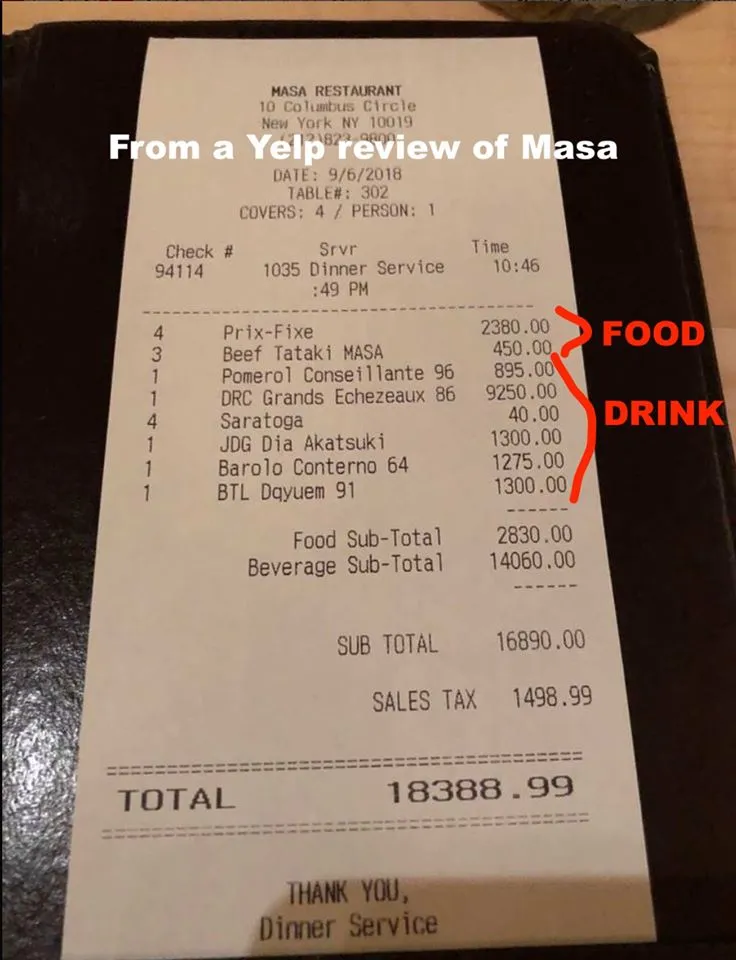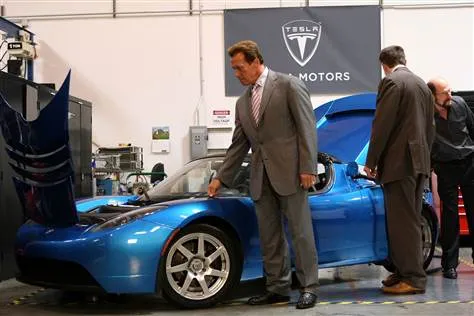
New York prices seem to be about the same as SF’s, but I’ve noticed that New York seems to like public displays of expensive consumption somewhat more than SF. Many wealthy people like to display status via consumption, and there’s a lucrative market for anyone who’s able to provide goods whose primary purpose it is to signal wealth.
I got curious about how that was reflected in the restaurant scene in NY. There’s a lot of really good food here; what’s the best food I can possibly get? Interestingly, while there’s a significant number of restaurants where meals are in the $100-$300 range, there’s only one place that’s substantially above that range (Masa) and a meal there costs about $600. While $600 is a tremendous amount to spend on a single meal for most people, it’s actually surprisingly low in terms of the other sorts of things that very wealthy people spend money on.
My theory on this is that the high end restaurants are actually already making the best meals they possibly could make given no restrictions on food budgets. For a cost of a few hundred dollars per person plus margin, a restaurant could probably source the best ingredients from all over the world, hire a staff of highly talented chefs to arrange this food in in complex labor-intensive arrangements for a 10+ course tasting menu, and serve it with talented and knowledgeable serving staff in a building that’s immaculately decorated. I have a theory that a restaurant that charged $2000/person instead of a few hundred dollars a person couldn’t provide an appreciably better gustatory product.
I don’t think the reason I don’t see this is because total market for restaurants this expensive is too small. If a hypothetical $2000/person restaurant served 20 people per evening (as some of the small omakase-style sushi places do), they’d still need to find ~7000 people per year excited to pay. However, there are 1.3 million households with assets of over $10m in the US (of which ~10% might be in NYC), so I don’t think finding customers would be a problem.
This is where alcohol comes in. The alcohol industry is able to provide items of demonstrably limited supply, such as a bottle of wine from a particular noteworthy vineyard from 40 years ago. These demonstrably limited supplies allow bottles of alcohol to go for several thousands of dollars and more. This solves the problem of allowing people who want to spend an arbitrary amount of money on a meal for status-signaling purposes to do so. If the $600/person meal isn’t enough, you can tack on $3000/person in alcohol, as this Yelper did.
I haven’t tasted fine wine beyond the $100/bottle mark so I don’t know what the quality-to-price ratio looks like at the expensive end of the curve, but there does not seem to be a ceiling on price. People like this Yelper ended up spending only 15% of their bill at the most expensive restaurant in the US on food. (At more than one bottle of wine per person, I hope they tasted the undoubtedly delicious sushi at all :/ )

I bring all this up because although demonstrations of wealth are probably an inseparable part of human nature, they can be co-opted to make the world a better place. Tesla did this extremely well, using a $100k luxury electric sports car to build economies of scale to introduce the somewhat more inexpensive and practical (though still expensive) Model S, and then used that money to launch the Model 3. Tesla managed to build a better world by allowing wealthy people to signal wealth via a fancy electric car.
The question then comes up of what other types of products could benefit from this approach.
Philanthropy is the obvious area where this already happens a lot, with ultra-wealthy people putting up money to build hospitals, cure diseases, support cultural institutions, and so forth. Celebrating philanthropic acts by wealthy people is one way of encouraging them to continue.
However, I also think there is a range of products where enabling arbitrarily large amounts of money to be spent on them would fund R&D that would bring economies of scale that would lower costs. Note that this is different from regular economies of scale; it’s something where a product that explicitly enables wealthy people to display their wealth also happens to have a side effect of driving valuable innovation. Basically, wealth and status games could be harnessed to make the world a better place.
These include:
- Making lab-grown “clean meat” a delicacy if initial production costs are too high for the mass market: Meat is delicious and many people find it easier to stay healthy and fit as omnivores, but at some point in the future we’re all going to agree that the era of mass factory farms was an abomination. If real meat can be created without also creating a brain subjected to pain and suffering, that’s a huge win. Costs will likely decline tremendously over time.
- Space hotels: If the radical drop in launch costs with SpaceX’s rocket reusability allow a space hotel to be feasible, a lot of human space exploration technology will get developed off the money of wealthy people who want a hotel room with the ultimate view. If this ends in the long term with humans becoming an interplanetary species and surviving some future extinction-level event on Earth, this is a huge win.
- Carbon credit trophies: I’m looking forward to one of the carbon credits companies coming up with a special way of rewarding people who buy a lot of carbon credits. Maybe it’s an orb that provides live video of the forest they’ve preserved, a prominent monument in a major city that adds names and contributions of the people collectively saving the climate, or a yearly gala that rewards the biggest contributors.